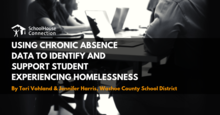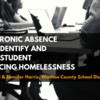0
Publication
Community:
Mar 20, 2019
To equip municipalities with the skills and tools to address these challenges, New York State created the $12 million Cities for Responsible Investment and Strategic Enforcement (Cities RISE) program, which provides leadership, management, and technical support to help 16 municipalities address deteriorating homes, vacant properties, and neighborhood decline through strategic code enforcement. Cities RISE uses code enforcement strategies to advance broader community development goals, and, in doing so, helps municipalities align programs aimed at improving residents’ quality of life.
Authored by: Aaron Shroyer How Housing Matters (The Urban Institute)
Topics: Community development, Data sharing, Homelessness, Housing, Legislation & Policy, Partnerships
 Shared by Housing Is
Shared by Housing Is
Housing Is posted a
on Mar 26, 2019
Aaron Shroyer How Housing Matters (The Urban Institute)
To equip municipalities with the skills and tools to address these challenges, New York State created the $12 million Cities for Responsible Investment and Strategic Enforcement (Cities RISE) program, which provides leadership, management, and technical support to help 16 municipalities address dete
0
Publication
Community:
Feb 15, 2019
Last month, the Los Angeles County Board of Supervisors voted unanimously to dedicate $5 million to preventing housing discrimination and to develop an ordinance to protect housing choice voucher holders from source of income discrimination. The supervisors have until May to draft the ordinance’s language and have not yet developed a timeline for enacting it, but these actions are a step toward expanding voucher holders’ housing options.
Authored by: Alyse Oneto, Martha Galvez, and Claudia Aranda for Urban Institute
Topics: Housing, Legislation & Policy, Low-income, Racial inequalities, West Coast
 Shared by Housing Is
Shared by Housing Is
Housing Is posted a
on Mar 13, 2019
Alyse Oneto, Martha Galvez, and Claudia Aranda for Urban Institute
Last month, the Los Angeles County Board of Supervisors voted unanimously to dedicate $5 million to preventing housing discrimination and to develop an ordinance to protect housing choice voucher holders from source of income discrimination.
0
Publication
Community:
Jan 25, 2019
As a result of decades of legalized discrimination in the housing industry, huge racial disparities in homeownership still exist today. This is not acceptable in a country founded on equal opportunity. Nationally, 72 percent of white households own a home, compared to only 42 percent of black households and 46 percent of Hispanic households. Homes typically make up the largest portion of a family’s overall wealth, so these disparities in homeownership are the most significant factor in the racial wealth gap.
Authored by: Kevin Campbell for Habitat for Humanity of Wake County
Topics: Asset building, Housing, Legislation & Policy, Racial inequalities
 Shared by Housing Is
Shared by Housing Is
Housing Is posted a
on Mar 11, 2019
Kevin Campbell for Habitat for Humanity of Wake County
As a result of decades of legalized discrimination in the housing industry, huge racial disparities in homeownership still exist today. This is not acceptable in a country founded on equal opportunity.
0
Publication
Community:
Feb 25, 2019
Why would a healthcare system get involved in the issue of affordable housing? Or play a critical role in establishing an affordable, high-quality preschool? That’s exactly what AdventHealth is doing in a partnership with the residents of the Communities of West Lakes in Orlando. They are just one of several healthcare industry partners investing in this neighborhood that houses some of their most frequent customers.
Authored by: Dr. Douglas P. Jutte and Carol Naughton for Purpose Built Communities
Topics: Health, Housing, Partnerships
 Shared by Housing Is
Shared by Housing Is
Housing Is posted a
on Mar 11, 2019
Dr. Douglas P. Jutte and Carol Naughton for Purpose Built Communities
Why would a healthcare system get involved in the issue of affordable housing? Or play a critical role in establishing an affordable, high-quality preschool? That’s exactly what AdventHealth is doing in a partnership with the residents of the Communities of West Lakes in Orlando.
0
Publication
Community:
Mar 6, 2019
Type the phrase “aging in place” into a Google search, and you’ll likely see pictures of wheelchairs fitting comfortably through home doorways, bathtubs and showers with zero-step entrances, and open floorplans to facilitate seamless movement from room to room. But what is often missed in discussions promoting aging in place is that increasing livability doesn’t just mean adapting a home’s physical characteristics, it also means ensuring a range of cost options and housing types in a single community.
Authored by: Martha Fedorowicz for How Housing Matters
Topics: Disabilities, Health, Housing, Place-based, Seniors
 Shared by Mica O'Brien
Shared by Mica O'Brien
Mica O'Brien posted a
on Mar 7, 2019
Martha Fedorowicz for How Housing Matters
Type the phrase “aging in place” into a Google search, and you’ll likely see pictures of wheelchairs fitting comfortably through home doorways, bathtubs and showers with zero-step entrances, and open floorplans to facilitate seamless movement from room to room.
0
Publication
Community:
Education Leads Home’s State Partnerships on Student Homelessness Project brings together policymakers and practitioners from with the goal of overcoming child and youth homelessness through education. Through the partnership, each state is committed to researching and implementing replicable best practices that address the most urgent needs of their unique homeless student populations. The State Partnerships on Student Homelessness Project is a nonpartisan effort to develop best practices that can be replicated by communities and states nationwide. In its inaugural year of the project, Education Leads Home (ELH) awarded six states – California, Kentucky, Hawaii, Nevada, Oregon, and Washington – small grants through a competitive process. ELH will provide ongoing technical assistance.
Authored by: Education Leads Home
Topics: Child welfare, Education, Funding, Homelessness, Housing, Low-income, Partnerships, Youth
 Shared by Housing Is
Shared by Housing Is
Housing Is posted a
on Mar 5, 2019
Education Leads Home’s State Partnerships on Student Homelessness Project brings together policymakers and practitioners from with the goal of overcoming child and youth homelessness through education.
0
Publication
Community:
The California Homeless Youth Project (HYP) is a research and policy initiative that highlights the issues and challenges faced by unaccompanied young people who are homeless or lack stable housing. This website provides state and local policymakers and others with information and policy resources specific to unaccompanied homeless youth, with a focus on young people in California.
Authored by: CA.gov
Topics: Education, Homelessness, Housing, Legislation & Policy, Research, West Coast
 Shared by Housing Is
Shared by Housing Is
Housing Is posted a
on Mar 5, 2019
The California Homeless Youth Project (HYP) is a research and policy initiative that highlights the issues and challenges faced by unaccompanied young people who are homeless or lack stable housing.
0
Publication
Community:
Feb 25, 2019
The 2019 state legislative season is in full swing, and SchoolHouse Connection is hard at work on 12 bills in 7 states (IN, KY, ME, NV, TN, TX, UT). We’re also supporting legislative advocates in 4 additional states (AZ, CA, MD, WA), and anticipate additional bills to be filed in LA, MO, NJ, and NC.
Authored by: SchoolHouse Connection
Topics: Child welfare, Education, Funding, Homelessness, Housing, Legislation & Policy, Low-income, Youth
 Shared by Housing Is
Shared by Housing Is
Housing Is posted a
on Feb 28, 2019
The 2019 state legislative season is in full swing, and SchoolHouse Connection is hard at work on 12 bills in 7 states (IN, KY, ME, NV, TN, TX, UT). We’re also supporting legislative advocates in 4 additional states (AZ, CA, MD, WA), and anticipate additional bills to be filed in LA, MO, NJ, and NC.
0
Publication
Community:
Feb 27, 2019
Over the past two decades, criminal justice reform has focused on evidence-based interventions to prevent arrests and incarceration and to facilitate community reintegration. These initiatives represent a movement toward a less punitive, more holistic approach to public safety, targeting critical social factors that lead to and perpetuate criminal justice involvement. Because housing problems are often a key underlying factor for people’s involvement with the criminal justice system, there are ways housing interventions can help lessen criminal justice involvement. Decriminalizing homelessness, for example, can reduce rates of initial arrest and incarceration, especially for people with low-level, nonviolent offenses. A sufficient supply of affordable housing and supportive services could help people stabilize after their release from jail and reduce the likelihood of recidivism. Policymakers, advocates, and practitioners in housing and criminal justice systems can partner to promote and evaluate housing strategies that divert people from the criminal justice system.
Authored by: Kimberly Burrowes for How Housing Matters (Urban Institute)
Topics: Criminal justice, Homelessness, Housing, Legislation & Policy, Low-income, Research, Stability
 Shared by Mica O'Brien
Shared by Mica O'Brien
Mica O'Brien posted a
on Feb 28, 2019
Kimberly Burrowes for How Housing Matters (Urban Institute)
Over the past two decades, criminal justice reform has focused on evidence-based interventions to prevent arrests and incarceration and to facilitate community reintegration.
0
Publication
Community:
Feb 19, 2019
So, are the stars better aligned for an infrastructure bill this year? Unfortunately, rhetoric only goes so far, and Washington continues to suffer from the same elemental failure as it did in 2017—the U.S. lacks a clear infrastructure vision. Only when Congress is ready to truly debate what objectives the federal government hopes to achieve—and how to invest to advance those goals—can we begin to craft a transformative national strategy.
Authored by: Adie Tomer and Joseph Kane for The Brookings Institution
Topics: Community development, Funding, Housing, Legislation & Policy, Transportation
 Shared by Housing Is
Shared by Housing Is
Housing Is posted a
on Feb 28, 2019
Adie Tomer and Joseph Kane for The Brookings Institution
So, are the stars better aligned for an infrastructure bill this year? Unfortunately, rhetoric only goes so far, and Washington continues to suffer from the same elemental failure as it did in 2017—the U.S. lacks a clear infrastructure vision.
0
Publication
Community:
We can imagine a future where everyone can find and afford a quality home. Where every neighborhood offers a diversity of housing options. And where people up and down the income ladder can enjoy housing security and build wealth through ownership. Achieving this vision requires more than incremental tinkering with today’s market institutions and public policies. It requires bold innovation by changemakers at all levels of government and in the private and nonprofit sectors.
Authored by: Urban Institute
Topics: Housing, Legislation & Policy, Mobility, Racial inequalities, Research
 Shared by Housing Is
Shared by Housing Is
Housing Is posted a
on Feb 21, 2019
We can imagine a future where everyone can find and afford a quality home. Where every neighborhood offers a diversity of housing options. And where people up and down the income ladder can enjoy housing security and build wealth through ownership.
0
Publication
Community:
Jan 31, 2019
For many years, the vulnerabilities of children experiencing homelessness have been glossed over on the assumption that their innate resilience would overcome the impact of homelessness. As someone who worked in the field, I would often hear, “Oh, they’ll never remember.” Today we know better. We know more about how the brain develops and about how trauma impacts brain development. There is a growing recognition among providers that these early years are critical for establishing a foundation for emotional, mental, and physical wellbeing, and that we don’t get a second chance at early childhood.
Authored by: Carol Klocek for SchoolHouse Connection
Topics: Early childhood, Education, Homelessness, Housing, Low-income, Research, Safety, Stability
 Shared by Housing Is
Shared by Housing Is
Housing Is posted a
on Feb 21, 2019
Carol Klocek for SchoolHouse Connection
For many years, the vulnerabilities of children experiencing homelessness have been glossed over on the assumption that their innate resilience would overcome the impact of homelessness. As someone who worked in the field, I would often hear, “Oh, they’ll never remember.” Today we know better.
0
Publication
Community:
Jan 15, 2019
Zoning, a topic usually buried in the real estate sections of local newspapers or debated at community planning meetings, has recently taken the national stage. Zoning figures prominently in the debates over the value that Amazon HQ2 will deliver to Arlington, Virginia, and New York City, while coverage of the affordable housing crisis in states like California blames local zoning restrictions. Cities like Minneapolis, which is radically rewriting its zoning codes, are being hailed as national models.
Authored by: Graham MacDonald, Solomon Greene, and Emma Nechamkin for the Urban Institute
Topics: Community development, Housing, Legislation & Policy, Research
 Shared by Housing Is
Shared by Housing Is
Housing Is posted a
on Feb 14, 2019
Graham MacDonald, Solomon Greene, and Emma Nechamkin for the Urban Institute
Zoning, a topic usually buried in the real estate sections of local newspapers or debated at community planning meetings, has recently taken the national stage.
0
Publication
Community:
Jan 18, 2019
The State of Arizona’s Medicaid agency (AHCCCS) recognizes the vital importance of safe, decent and affordable housing to health. With a portfolio of over 3,000 units of affordable housing for Medicaid members with a determination of serious mental illness (SMI) and/or substance use disorder, housing is a major component of how the State of Arizona assists those trying to recover and stabilize.
Authored by: Josh Crites for The Journal of Housing & Community Development
Topics: Health, Housing, Low-income, Medicaid / Medicare, Partnerships, Place-based
 Shared by Mica O'Brien
Shared by Mica O'Brien
Mica O'Brien posted a
on Feb 7, 2019
Josh Crites for The Journal of Housing & Community Development
The State of Arizona’s Medicaid agency (AHCCCS) recognizes the vital importance of safe, decent and affordable housing to health.
0
Publication
Community:
Feb 6, 2019
Decent, stable, and affordable rental housing has the power to improve lives, yet background checks and other systemic barriers reduce housing access and stability for a large part of the population—people who have been arrested or who are reentering communities after incarceration. The number of people who can be shut out of rental housing by criminal background checks and related policies calls for a national and local conversation about evidence-based ways to balance public safety and cohesion goals while supporting people with justice system histories in finding stable housing. Achieving this balance could interrupt cycles of inequity.
Authored by: Veronica Gaitan and Maya Brennan for How Housing Matters, Urban Institute
Topics: Criminal justice, Homelessness, Housing
 Shared by Housing Is
Shared by Housing Is
Housing Is posted a
on Feb 7, 2019
Veronica Gaitan and Maya Brennan for How Housing Matters, Urban Institute
Decent, stable, and affordable rental housing has the power to improve lives, yet background checks and other systemic barriers reduce housing access and stability for a large part of the population—people who have been arrested or who are reentering communities after incarceration.
0
Publication
Community:
Build success with effective enforcement. Someone who smokes where smoking is prohibited is violating the policy. Enforcement of the smoke-free policy is similar to enforcement of other building policies, like noise or pet restrictions. Be consistent, fair, positive, and pragmatic.
Authored by: Building Success
Topics: Health, Housing, Legislation & Policy, Smoke-free
 Shared by Housing Is
Shared by Housing Is
Housing Is posted a
on Feb 4, 2019
Build success with effective enforcement. Someone who smokes where smoking is prohibited is violating the policy. Enforcement of the smoke-free policy is similar to enforcement of other building policies, like noise or pet restrictions. Be consistent, fair, positive, and pragmatic.
0
Publication
Community:
Build success by helping smokers comply with the policy. Some residents who smoke may not be ready or able to stop smoking, but you can work with them to help them comply with the policy. Showing compassion to residents facing barriers to compliance may increase acceptance of the policy and willingness to comply.
Authored by: Building Success
Topics: Health, Housing, Legislation & Policy, Smoke-free
 Shared by Housing Is
Shared by Housing Is
Housing Is posted a
on Feb 4, 2019
Build success by helping smokers comply with the policy. Some residents who smoke may not be ready or able to stop smoking, but you can work with them to help them comply with the policy.
0
Publication
Community:
Build success by supporting cessation among smokers for whom a smoke-free housing policy may provide motivation to quit.
Authored by: Building Success
Topics: Health, Housing, Legislation & Policy, Smoke-free
 Shared by Housing Is
Shared by Housing Is
Housing Is posted a
on Feb 4, 2019
Build success by supporting cessation among smokers for whom a smoke-free housing policy may provide motivation to quit.
0
Publication
Community:
Build success by partnering with local agencies and organizations. Community partners can advise during planning, education residents during implementation, and help support cessation.
Authored by: Building Success
Topics: Health, Housing, Legislation & Policy, Partnerships, Smoke-free
 Shared by Housing Is
Shared by Housing Is
Housing Is posted a
on Feb 4, 2019
Build success by partnering with local agencies and organizations. Community partners can advise during planning, education residents during implementation, and help support cessation.
0
Publication
Community:
Build success by training staff on how to effectively share information about the policy and the importance of consistent enforcement.
Authored by: Building Success
Topics: Health, Housing, Legislation & Policy, Smoke-free
 Shared by Housing Is
Shared by Housing Is
Housing Is posted a
on Feb 4, 2019
Build success by training staff on how to effectively share information about the policy and the importance of consistent enforcement.
0
Publication
Community:
Build Success by engaging residents. Residents can be a strong asset in planning, communication, implementation, and compliance efforts.
Authored by: Building Success
Topics: Health, Housing, Legislation & Policy, Place-based, Smoke-free
 Shared by Housing Is
Shared by Housing Is
Housing Is posted a
on Feb 4, 2019
Build Success by engaging residents. Residents can be a strong asset in planning, communication, implementation, and compliance efforts.
0
Publication
Community:
Developing effective smoke-free policies requires clear language about why the policy is being adopted, where smoking is and isn't allowed, who is responsible for reporting and investigating violations, and how the policy will be enforced.
Authored by: Building Success
Topics: Housing, Legislation & Policy, Place-based, Smoke-free
 Shared by Housing Is
Shared by Housing Is
Housing Is posted a
on Feb 4, 2019
Developing effective smoke-free policies requires clear language about why the policy is being adopted, where smoking is and isn't allowed, who is responsible for reporting and investigating violations, and how the policy will be enforced.
0
Publication
Community:
Evidence shows that retrofitting the entire stock of multifamily apartment buildings in the United States could save tenants and property owners $8 billion a year in energy costs and reduce electricity consumption by almost 15 percent. Amid the rising cost of housing, energy efficiency upgrades can provide much-needed relief to low-income families and help keep rental stock affordable, but few documented examples showcase the benefits of energy retrofits in multifamily housing. Addressing this gap, this study measures the impact of a collaborative energy efficiency program in Orlando, Florida, analyzing energy costs before and after retrofits in four multifamily apartment complexes.
Authored by: Nicholas Taylor, Jennison Searcy, and Pierce Jones for Energy Efficiency
Topics: Energy, Housing, Low-income, Research, Sustainability
 Shared by Housing Is
Shared by Housing Is
Housing Is posted a
on Jan 31, 2019
Nicholas Taylor, Jennison Searcy, and Pierce Jones for Energy Efficiency
Evidence shows that retrofitting the entire stock of multifamily apartment buildings in the United States could save tenants and property owners $8 billion a year in energy costs and reduce electricity consumption by almost 15 percent.
0
Publication
Community:
Jan 9, 2019
In this post, we hope to inspire others working in PreK-12 educational settings to examine rates of chronic absenteeism among the students they serve. We define chronic absenteeism and share three graphic displays of chronic absence data from our school district, the Washoe County School District located in Reno, NV.
Authored by: Tori Vohland and Jennifer Harris for Schoolhouse Connection
Topics: Attendance, Child welfare, Education, Homelessness, Housing, Partnerships, Youth
 Shared by Mica O'Brien
Shared by Mica O'Brien
Mica O'Brien posted a
on Jan 24, 2019
Tori Vohland and Jennifer Harris for Schoolhouse Connection
In this post, we hope to inspire others working in PreK-12 educational settings to examine rates of chronic absenteeism among the students they serve.
0
Publication
Community:
Jan 23, 2019
To explore the benefits and challenges of rapid re-housing support services, How Housing Matters asked a group of experts to weigh in. Contributing to the discussion are Kathryn Monet, chief executive officer at the National Coalition for Homeless Veterans, Jacob Donnelly, director of supportive services at Swords to Plowshares, and Samantha Batko, research associate at the Urban Institute.
Authored by: How Housing Matters for The Urban Institute
Topics: Asset building, Health, Homelessness, Housing, Low-income, Supportive housing, Workforce development
 Shared by Housing Is
Shared by Housing Is
Housing Is posted a
on Jan 24, 2019
How Housing Matters for The Urban Institute
To explore the benefits and challenges of rapid re-housing support services, How Housing Matters asked a group of experts to weigh in.
 Shared by Housing Is
on Mar 26, 2019
Shared by Housing Is
on Mar 26, 2019
 Shared by Housing Is
on Mar 13, 2019
Shared by Housing Is
on Mar 13, 2019
 Shared by Housing Is
on Mar 11, 2019
Shared by Housing Is
on Mar 11, 2019

 Shared by Housing Is
on Mar 11, 2019
Shared by Housing Is
on Mar 11, 2019


 Shared by Housing Is
on Mar 5, 2019
Shared by Housing Is
on Mar 5, 2019

 Shared by Housing Is
on Mar 5, 2019
Shared by Housing Is
on Mar 5, 2019

 Shared by Housing Is
on Feb 28, 2019
Shared by Housing Is
on Feb 28, 2019

 Shared by Housing Is
on Feb 28, 2019
Shared by Housing Is
on Feb 28, 2019
 Shared by Housing Is
on Feb 21, 2019
Shared by Housing Is
on Feb 21, 2019

 Shared by Housing Is
on Feb 21, 2019
Shared by Housing Is
on Feb 21, 2019

 Shared by Housing Is
on Feb 14, 2019
Shared by Housing Is
on Feb 14, 2019
 Shared by Housing Is
on Feb 7, 2019
Shared by Housing Is
on Feb 7, 2019
 Shared by Housing Is
on Feb 4, 2019
Shared by Housing Is
on Feb 4, 2019
 Shared by Housing Is
on Feb 4, 2019
Shared by Housing Is
on Feb 4, 2019
 Shared by Housing Is
on Feb 4, 2019
Shared by Housing Is
on Feb 4, 2019
 Shared by Housing Is
on Feb 4, 2019
Shared by Housing Is
on Feb 4, 2019
 Shared by Housing Is
on Feb 4, 2019
Shared by Housing Is
on Feb 4, 2019
 Shared by Housing Is
on Feb 4, 2019
Shared by Housing Is
on Feb 4, 2019
 Shared by Housing Is
on Feb 4, 2019
Shared by Housing Is
on Feb 4, 2019
 Shared by Housing Is
on Jan 31, 2019
Shared by Housing Is
on Jan 31, 2019


 Shared by Housing Is
on Jan 24, 2019
Shared by Housing Is
on Jan 24, 2019



